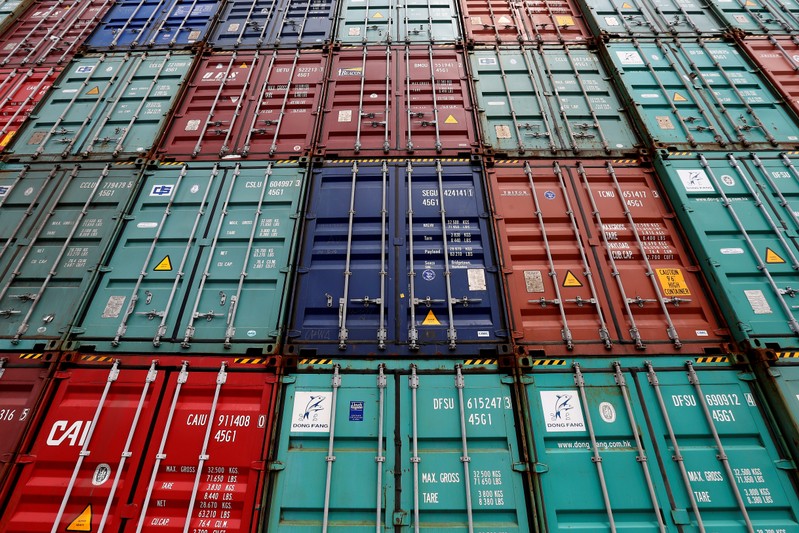
FILE PHOTO: A stack of shipping containers are pictured in the Port of Miami in Miami, Florida, U.S., May 19, 2016. REUTERS/Carlo Allegri/File Photo
August 14, 2019
By Lucia Mutikani
WASHINGTON (Reuters) – U.S. import prices unexpectedly rose in July, but the underlying trend continued to be weak, pointing to subdued imported inflation pressures.
The report from the Labor Department on Wednesday suggested inflation could remain moderate despite a broad increase in consumer prices in July, which could allow the Federal Reserve to cut interest rate further to limit the damage to the economy from trade tensions.
The Trump administration on Tuesday delayed imposing a 10% import tariff on laptops, cell phones, video game consoles and a wide range of other products made in China until mid-December, saying the move was to avoid hurting American shoppers heading into the Christmas holiday.
Economists said the delay of the duties, which had been scheduled to kick off on Sept. 1, still left a cloud over the economy. Fears about the impact of the trade war on the U.S. economic expansion, the longest in history, prompted the Fed to cut its short-term lending rate by 25 basis points last month for the first time since 2008.
Import prices increased 0.2% last month as a rebound in the cost of petroleum products offset declines in prices for capital goods and motor vehicles, the government said. Data for June was revised down to show import prices dropping 1.1% instead of falling 0.9% as previously reported.
Economists polled by Reuters had forecast import prices would be unchanged in July. In the 12 months through July, import prices dropped 1.8% after decreasing 2.0% in June. Import prices exclude tariffs.
U.S. stock index futures were trading sharply lower as weak Chinese and German data triggered recession fears. Prices of U.S. Treasuries rose while the dollar <.DXY> was slightly stronger against a basket of currencies.
EXPORT PRICES REBOUND In July, prices for imported fuels and lubricants rebounded 1.8% after falling 7.3% in the prior month. Petroleum prices increased 1.9% after plunging 7.0% in June. Imported food prices fell 0.5%, the third straight monthly drop.
Excluding fuels and food, import prices were unchanged last month after dropping 0.2% in June. The core import prices fell 1.5% in the 12 months through July.
The cost of imported capital goods decreased 0.1% last month after falling 0.2% in June. The price of imported motor vehicles and parts declined 0.3% last month.
Prices for imported consumer goods excluding automobiles rose 0.2% after being unchanged in June.
The cost of goods imported from China dipped 0.1% last month after falling 0.2% in June. Prices fell 1.6% in the 12 months through July, matching June’s decline.
The report also showed export prices rose 0.2% in July, boosted by gains in prices for agricultural and nonagricultural products, after declining for two straight months. Export prices fell 0.9% on a year-on-year basis in July after decreasing 1.6% in June.
Prices for exported agricultural products rose 0.4%, lifted by a surge in prices for soybeans, other animal feeds, nuts and vegetables. Prices for agricultural products jumped 3.7% in the 12 months to July, the largest advance since June 2017.
Prices for exported nonagricultural goods rose 0.2% in July after tumbling 1.0% in June. In the 12 months through July, prices dropped 1.5%.
(Reporting by Lucia Mutikani; Editing by Paul Simao)

